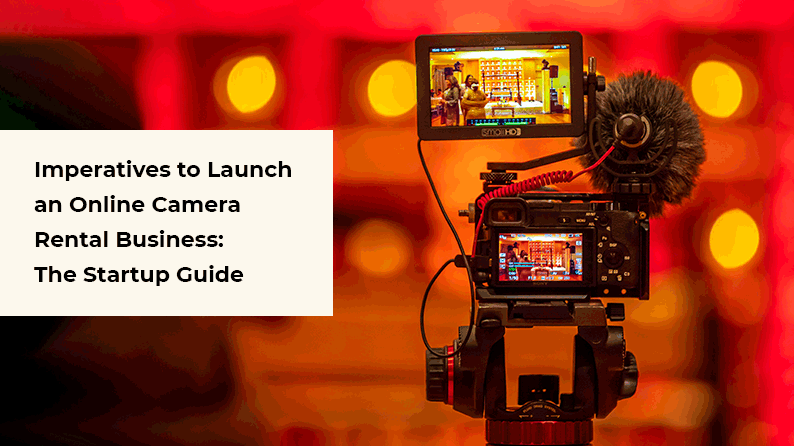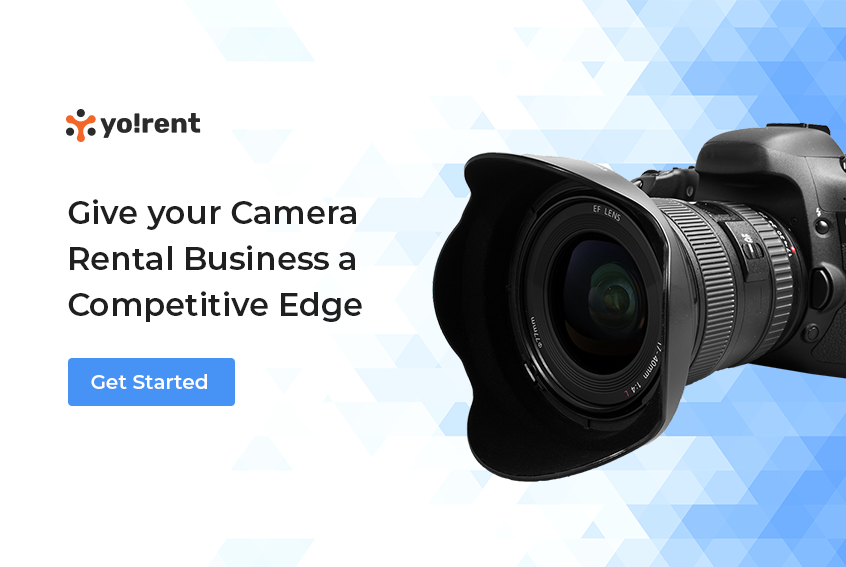The strong upturn in the rental and sharing economies is evident of the world readjusting to renting products over purchasing. Similar is the case with the camera rental industry that saw its inception in the late 2000s and grew year after year. The industry saw a growing number of customers due to a wide majority of reasons with the recognition of rental benefits being the most notable.
The rental model provided customers with benefits like relief from the headache of the cost of ownership and its long-term maintenance. Rental also proved to be more economical than buying, especially for one-time usage while giving camera owners the opportunity to earn by renting out their idle camera equipment. Capitalizing on these benefits, numerous types of businesses were launched in the camera rental industry with diverse offerings that we will be discussing in the blog below. Before that, it is important to understand the industry’s future scope and consumer psychology:
Table of Contents
- Future Scope of the Camera Rental Industry
- Consumer Psychology in the Camera Rental Industry
- Types of Camera Rental Businesses
- Success Stories
- Market Offerings of Online Camera Rental Businesses
- Key Revenue Streams
- How to Develop a Camera Rental Website
- How Camera Rental Software Helps?
- Summing Up
Future Scope of the Camera Rental Industry
With changing trends, investing in the camera rental industry is a lucrative source of customer acquisition for the future. Customers unaware of the option to lend often tend to dispose of cameras or give them to a friend or family member totally free of charge. If neither is the case then the camera sits in a dark cupboard for several years.
However, with consumers having the means to rent out cameras, they can get the best ROI on expensive cameras that they purchased years ago by renting them out on an online marketplace.
For businesses, launching a B2B or B2C camera rental store is equally profitable especially after the pandemic due two main reasons:
- The effects of the pandemic are going to last. During the worldwide lockdowns, several business models moved to digital and required individuals from various professions to purchase or rent video cameras and other audio-visual (AV) equipment.
- Global industries are dedicated to bringing a change in the environmental impact of their products. Similar is the case with the digital camera industry where rental business models resonate with sustainability and waste reduction. Moreover, re-use of cameras is not only eco-friendly but also capital-saving as it allows the scope to earn profit by using the same inventory again and again.
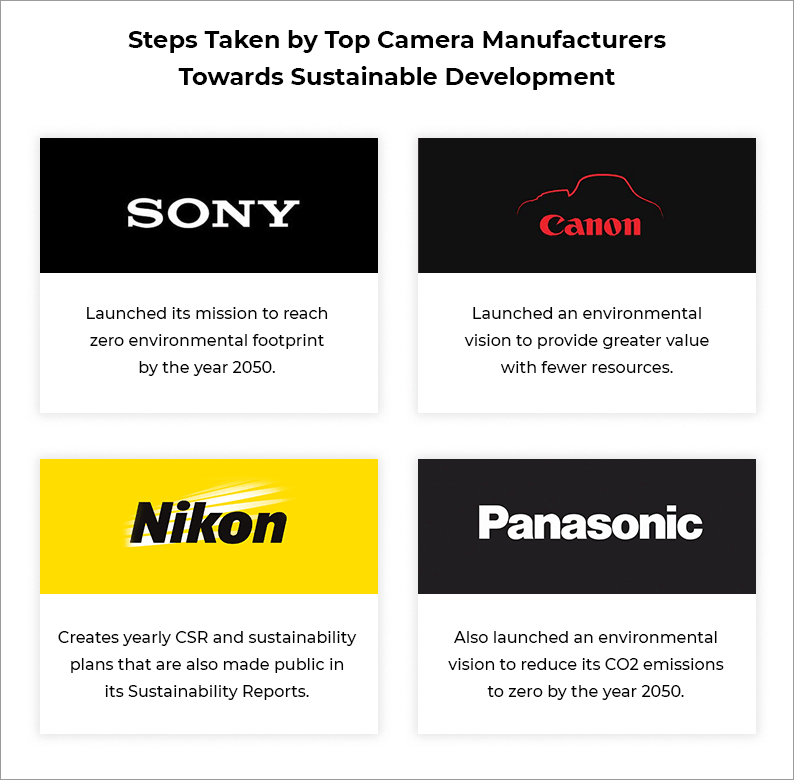
Understanding the Consumer Psychology in the Camera Rental Industry
In this section, we are going to discuss two things:
1. Why Do People Rent Cameras?
The new camera usage trends manifested in modern times highlight the need for rental cameras vividly. Although millennials and Gen Z population now use mobile cameras for daily photography and video recording, those don’t have powerful lenses and settings for professional environments. The ones that are suitable cost too high and often overboard the budget. Cheap cameras on the other hand receive a tough competition from smartphones, due to which the modern brands enhance them and again sell at a higher price.
With such a scenario, both professional photographers and one-time camera users find renting a camera a much better option than purchase. Not to mention, the aforementioned benefits, like no need for long-term maintenance and paying ownership cost, further improve consumer preferences to rent.
2. Who Uses Rental Cameras?
The rental camera niche has a diverse target of users including:
- Professional Photographers
Professional photographers need a rental camera in situations like while expanding their business, starting a new photo studio, when their camera is damaged, to get hands on the advanced tech or while travelling. The term professional photographers is also a broad term that can be used for the following:
- Wedding photographers
- Sports photographers
- Business photographers
- Wildlife photographers
- Fashion photographers
- Photo booth studios
- Filmmakers
Even major film studios don’t have an in-house team for movie development. For this reason, they hire DPs, director of photography who is responsible for all the camera equipment. However, in case of small producers, directors or new filmmakers, renting out the entire filmmaking equipment, such as audio, video, lighting and computing is very beneficial.
- Aspiring Actors and Models
The acting and modelling industry is dependent on cameras with dynamic trends every year. To deliver eye-catching performances and photoshoots, the management teams of actors and models require powerful cameras and other AV equipment. While some of them can purchase the equipment, some also prefer renting.
- Content Creators
The YouTube community is one of the fastest growing communities of the world. As per the statistics, there were more than 37 million YouTube channels in 2021. Out of these 37 million, 1.3 million channels have more than 10,000 subscribers and probably upload videos on a regular basis. To provide a better video quality and shoot videos in high-definition, numerous content creators on YouTube tend to rent out cameras and studio setups. However, YouTube is not the only platform where content creators are present today. Some other top channels that are densely populated with video content creators in 2021 are TikTok, Instagram and Facebook.
- Music Production Houses
Back in the 20th century, music was something people only used to listen to. But, with the emergence of music videos, the entire industry changed. Starting in the 1980s, music production houses started releasing music videos that eventually became the norm by the 2000s. Music channels such as MTV, VH1 and BET Jams gained worldwide popularity and watching music videos became a household thing. Emergence of YouTube and its monetary aspects further fueled the need to release music videos. Such a prolific upsurge in music videos entailed the requirement for rental cameras all around the globe.
- Tourists and Travellers
Tourism is a big industry that generates billions of dollars every year. With relaxations on travel restrictions in 2021, the tourism industry is going to recover at a fast rate. Similarly, domestic tourism and travelling is also going to increase. Rental cameras in these industries are required by several types of customers such as bloggers, vloggers, adventurists, social activists and other travel enthusiasts.
- General Public
In addition to the above-mentioned users, the general public also tends to rent cameras, lenses and various audio video equipment for their personal events, trips and other occasions.
Different Types of Camera Rental Businesses
The following types of businesses conduct the majority of online camera rental operations:
Lens Rental Businesses
Camera lenses alone are a powerful product offering in the camera rental industry. This is due to the costly price of lenses and their high usability. Instead of renting or replacing an entire camera, the target audience of these websites simply prefer to rent out lenses instead. One benefit of launching a dedicated website for renting out camera lenses is product bundling (read the section “Market Offerings of Online Camera Rental Businesses” for a better understanding) as the consumers of such a business tend to rent out sets of lenses.
Standalone Camera Rental Businesses
These types of rental businesses have their value proposition strictly limited to camera rental operations. They provide different types of cameras to various users for various use cases. However, their target audience remains quite limited. Standalone camera rental businesses also do some upselling but the bulk of their operations revolve around renting out cameras and related accessories.
Audio and Video Equipment Rental Businesses
Moving on from standalone camera rental businesses, online audio and video equipment rental businesses have a broader market offering that is inclusive of audio, video and lighting solutions. The target audience that falls under this business type is quite wide and has a long list of demands that the business can fulfil. Thus, clearly highlighting the huge scope for profit when compared to standalone camera rental businesses.
Complete Photo Studio Setup Businesses
Camera rental businesses falling under this category primarily target B2B audiences. Setting up professional studios with a complete package of rental camera equipment (including lighting, audio, video, monitors, lenses, dollies and other infrastructure) is their main value proposition. Despite being heavily capital-intensive, the profit margin in studio setup businesses is the highest. The primary customers of studio setup businesses include film and TV producers, professional photographers, actors, models and YouTubers.
Peer-to-Peer Camera Rental Businesses
Unlike all aforementioned types of businesses, peer-to-peer businesses involve camera and AV equipment rental operations between the general population. The lenders in these businesses aren’t professional cameramen or dealers but the general public, so as the customers who are willing to rent a used camera at a small price. Peer-to-Peer camera rental businesses are fairly unique and share the revenue streams of our next business type.
Multi-vendor Camera Rental Marketplaces
Online marketplace operations in the camera rental industry are possible. On such marketplaces, various vendors, such as merchants, manufacturers, and dealers sign up and rent out their cameras. The marketplace owner on the other hand does not own any of the cameras. Such types of businesses are also known as asset-light businesses as they require the business owner to manage the bare minimum capital. The primary revenue stream in peer-to-peer and rental marketplaces for the owner is rental commission. Secondary revenue streams are subscription packages, display ads, featured listings, etc.
Launch your own online camera rental business with YoRent
Success Stories of Online Camera Rental Businesses
Despite the camera rental niche being fairly new in the rental and sharing economy, several businesses have already established their name. Below are the stories of two online camera rental businesses that achieved tremendous success in the industry:
1. LensRentals
Business Type: Single Vendor Store
LensRentals is one of the biggest names in the online camera rental industry. Those who are aware about its success are mostly unaware of the efforts of its founder Roger Cicala. The company was founded in September 2006 by Cicala as an MVP to rent out his personal camera collection.
The idea for the website came to Cicala when he realized he had spent $5,500 of his hard-earned money on a camera and lenses that he only intended to use once. Thus, to recover the costs, he uploaded his entire inventory on the MVP and rented out his entire collection within a span of four months.
In January 2007, Cicala invested $30,000 in his business idea and generated $13,000 profit in the first month. Gradually, the business grew and generated $3 million revenue two years later. In the year 2013, the company crossed the $10 million mark by generating a whopping $13 million.
According to reports, the current estimated revenue of LensRentals is $19 million.
2. KitSplit
Business Type: Asset-Light/Peer-to-Peer Marketplace
Co-founders Lisbeth Kaufman and Kristina Budelis launched KitSplit in the year 2015 as an peer-to-peer camera rental platform. The business soon gained traction and attracted creative professionals from various industries to rent out quality equipment ranging from cameras and lenses to audio recorders and drones, all at a highly-competitive rental fee.
Soon the business gained popularity and KitSplit acquired the competitor CameraLends. Today, the platform has around 30,000 owners renting out their various audio visual equipment. In the long list of KitSplit’s clients, there are also some big names like NBC, VOX, Hearst and National Geographic.
As per the reports, KitSplit has total listings of worth $40 million on its platform and a full-fledged range of equipment to start an entire Hollywood studio. To boost its operations, KitSplit raised a total seed funding of $2.1 million in 2018.
Scalable Camera Rental Software for all Business Types
Market Offerings of Online Camera Rental Businesses
Several camera rental businesses have specific and very limited offerings, which also becomes their unique selling propositions (USPs). On the other hand, there are some essential offerings that are must have for all online camera rental businesses. To generalize and sum all propositions and offerings in one equation, we can say that online camera rental businesses are strongly saturated with the following:
1. Rental Cameras: These may be the primary offering of a camera rental business, but it can also offer many more products and services.
2. Add-on accessories: Rental cameras may not be appropriately functional without certain accessories like tripod stands and memory cards. Thus, these are an important value proposition for the majority of camera rental businesses. The sole camera rental business model that is viable without the supply of camera accessories is the peer-to-peer camera rental model, where the customer may need to arrange all accessories on his own. However, all other camera rental business models are underpinned by hundreds of add-on accessories that make the rental cameras usable.
Below is the list of some important add-on accessories that are required on an online camera rental store:
- Lenses
- Films
- Tripod stands
- Light panels and night stands
- UV Filters
- Cleaning alcohol, brushes and other equipment
- SD cards
- Batteries
- Remote triggers for picture clicking and flash
3. Add-on Services: Add-on services are quite similar to add-on accessories but not always required. This means that without them, successful camera rental operations are still possible. Nevertheless, a camera rental platform can provide these services as complimentary add-ons and increase its revenue channel. To sum it up, add-on services will purely sell on demand basis and can help camera rental business owners generate some extra revenue.
Some possible add-on services on a camera rental store are:
- Product demonstrations
- Studio setup
- Lens cleaning
- Camera operator
4. Product Bundling: Product bundling is a strategy that is used to sell more products to customers. Under this strategy, multiple products are put together and priced a single unit to create value for the customer. For example, the customer may not need to browse the entire store or visit competitors to find all necessary products if they are available in a single package. Majority of the time, business owners can also afford providing some discounts on product bundling due to increased profit margin, which also increases sales. Some of the bundles that business owners can offer on a camera rental store are:
- Camera, memory card, tripod stands, remote trigger
- Camera case, bag, memory card, lenses, lens cleaner
- Camera strap, tripod stand, flash, memory card reader
With expert knowledge, camera rental business owners can make more useful bundles and sell them at huge profits.
Revenue Streams for an Online Camera Rental Business
A major benefit of the digital transition of a traditional business approach is access to multiple and exclusive revenue channels. Similar is the case with online camera rental businesses that provide the business owner with various revenue streams like:
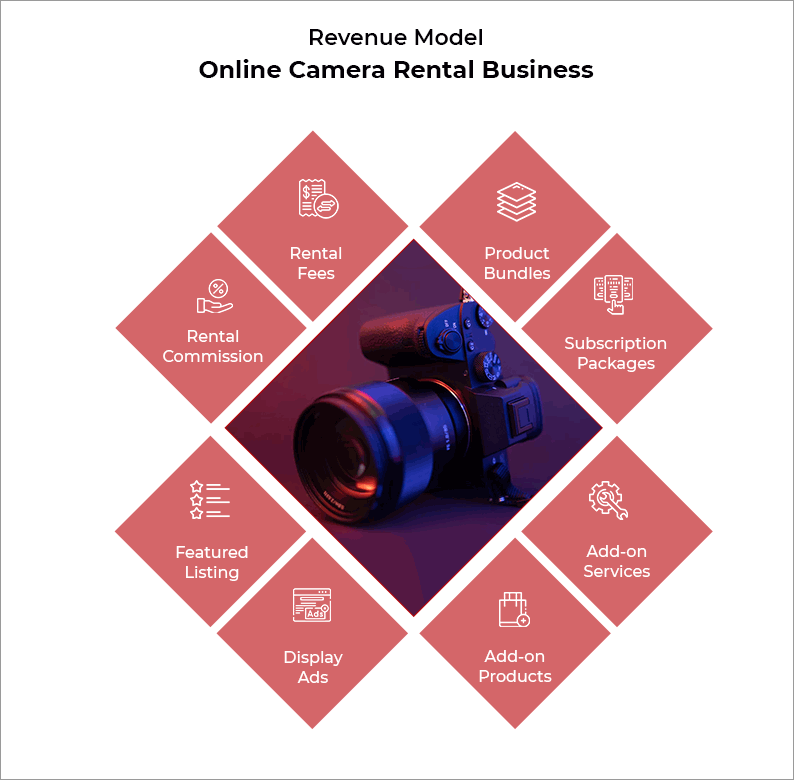
How to Develop a Camera Rental Website
A website is the crucial part of any online business. The functionality, features and design of a website varies from business to business and personal preference. To launch an online camera rental business, entrepreneurs will mainly require two imperatives on their website, which are a captivating design and the right set of functionality. Appropriate functionality will also help entrepreneurs overcome numerous operational challenges and deal with problematic use cases.
Below we have given some depth to both these imperatives:
Designing the Website
Due to the variety of offerings, the design of a camera rental website is focused towards simplifying search and navigation. As the entire camera rental concept may also be new to visitors, it is also important to explain to them how camera rental operations on your website work. Lastly, to build trust and branding, user-friendliness and branding elements should also be put in the right equilibrium with consistency all over the website.
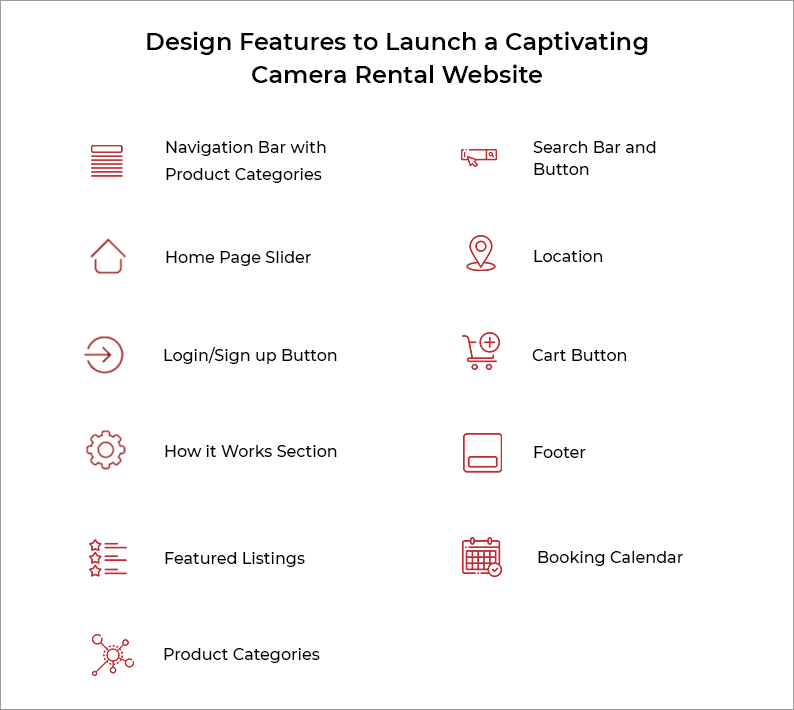
Note: All aforementioned features are for advisory purposes only. Your actual camera rental website can require additional elements.
Schedule a Free Personalized Demo of Leading Camera Rental Software
Adding Functionality to Overcome Persistent Business Challenges
Challenge 1: Complications Arising due to Costly Equipment
Professional cameras, lenses and all related accessories are very costly. Due to this there is the problem of maintaining a regular stock of inventory and ensuring product safety. Another problem that arrives is quoting complex rental orders whose price cannot be determined so easily. To resolve this challenge, the following features are required on a camera rental website
- Request for Quote (RFQ) module for handling complex orders
- Document verification and rental security management to ensure product safety
- Late cancellation charges and notification reminders to ensure timely return of equipment
- Multi-vendor support to launch an asset-light business as an alternative
Challenge 2: Handling Repair Work and Maintenance
Rental businesses often face the problem of customers returning them damaged products. While the above-mentioned rental security management feature helps them collect the reimbursement for any theft and damage, it does not help them resolve the inventory problem. What happens on a rental eCommerce platform when a product is returned in damaged condition is that the reflected inventory does not represent the actual inventory as some of it is still under repair. Solution:
- Rental buffer period: This is a time period that is manually set by the business owner on a product level. It is not until that this period is over that the inventory is reflected back in the stock. For example, if the buffer period for a specific camera model is 5 days, it will be only added back to the inventory after 5 days of return. The only exception to this rental buffer period is when the admin manually increases the inventory on the software. Business owners can use the buffer period for various reasons such as equipment inspection and repair.
Challenge 3: Delivery Problems
eCommerce businesses face a myriad of delivery problems. Similar is the case with online camera rental businesses. Their delivery problems range from reducing the delivery costs, applying appropriate delivery charges, ensuring timely delivery, providing tracking services and managing lost deliveries. The following features or integrations can assist camera rental business owners in resolving these issues to some extent:
- Shipping Management Module: The module has various features to track deliveries, add delivery partners, and create pickup addresses. All these features streamline the process between the camera rental business and delivery partner to reduce delivery costs, ensure timely dispatch and track lost deliveries.
- Custom Shipping Labels: This option allows the business owner to create multiple shipping options for customers. The options can either be regular delivery, fast delivery, one-day delivery or any other custom delivery. This provides the business owner with the option to try and test multiple delivery prices.
- Order Tracking: Order tracking plugins such as Aftership allow customers to track their orders for better satisfaction
Challenge 4: Ensuring Quality Service to Tourists and Immigrants
Tourists and non-residents are an important target audience of online camera rental stores. Providing them with maximum convenience can improve your brand’s value for them. Thus, to enhance the customer experience for tourists and immigrants, camera rental business owners can rely on the following features:
- Multi-Currency support to accept payment in multiple currencies
- Real-time exchange rate converter to display the exact pricing of equipment in different currencies without any manual entry
- Multi-lingual support to display the website’s content in multiple languages
- Multiple payment gateways and options to provide customers with the choice of their most preferred payment method
Challenge 5: Low Customer Retention Rates
The variety of products on camera rental stores, including the numerous brands and vendors (on marketplace platforms) create the problem of indecisiveness for customers. When this happens, they delay bookings and sometimes even visit competitors. Following features assist in reducing the indecisiveness and consumer defection on an eCommerce store:
- Product comparison to allow customers to compare multiple products at once
- Custom filters that allow helpful comparisons by adding custom attributes to multiple products
- Product reviews and ratings to assist customers in making faster decisions
- Vendor reviews and ratings (on a marketplace platform) to assist customers in making faster decisions
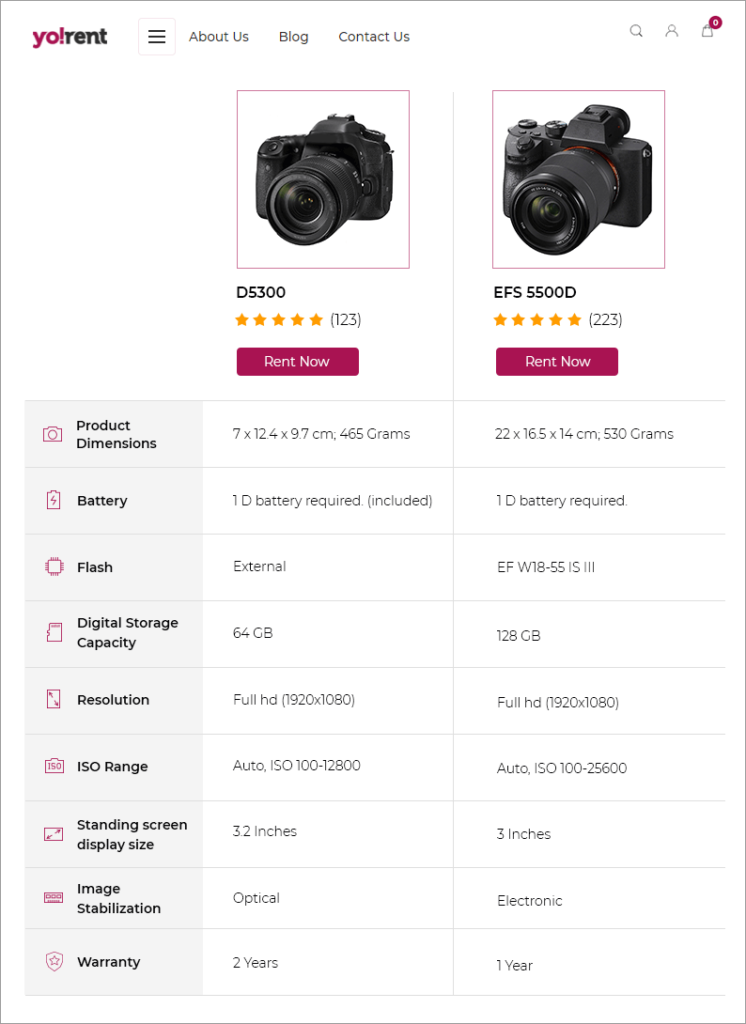
How Online Camera Rental Software Helps?
In contrast to the traditional conventions, modern software solutions are a much faster and cost-effective way to launch high-quality platforms for conducting profitable eCommerce operations. Keeping this in mind, modern camera rental software are highly-recommended to modern-entrepreneurs for launching a versatile future-ready camera rental store.
Readymade camera rental software are developed with thorough analysis of the industry and are inclusive of those features that resolve numerous business challenges (like the ones mentioned above) unique to the camera rental niche. Being readymade, they do not require the business owner to have the knowledge of programming or develop the store from scratch.
Instead, what business owners can do is deploy a ready-made solution on a server, add listings and start a running business within a short span of time. Unlike SaaS solutions, modern camera rental solutions are also fully scalable and often available at a one-time cost.
Get Expert Advice to Launch your Online Camera Rental Business
Summing Up
Viewing the increasing consumption patterns in the online camera rental industry, entrepreneurs should expect an unprecedented increase in the competition in the near future. Also, the nascent stage of the industry means numerous bottlenecks for startups. However, those who launch their online camera rental businesses early can work across functionalities and resolve the bottlenecks in time to establish a reputable brand name and conduct profitable camera rental operations. Modern technologies such as various rental management software, AV rental software and third-party APIs can also help entrepreneurs in streamlining the majority of work and overcoming the most persistent challenges.
